Spain baggage-handler strikes: timetable and airports

Spain's Azul Handling, which services Ryanair group flights, will continue nationwide labor actions through late 2025. After initial windowed stoppages, unions escalated to an indefinite, daily strike from October 1, 2025, while Spain's transport ministry set mandatory minimum services that vary by airport and route type. Travelers should plan around morning, midday, and late-evening windows, expect slower check-in and baggage delivery, and verify flight status before departing for the airport. Affected airports include major mainland hubs and Spanish islands.
Key points
- Why it matters: Peak-hour stoppages slow check-in, boarding, and baggage, risking missed connections.
- Travel impact: Three strike windows, 500-900, 1200-1500, 2100-2359, local.
- What's next: Daily, indefinite action from October 1 under UGT's nationwide call, pending further orders.
- Minimum-service protection differs by airport and month, with October and November percentages published.
- AENA advises passengers to confirm flights with airlines during the Azul Handling strike.
Snapshot
The strike began with a three-day launch, August 15 to 17, followed by recurring actions on Wednesdays, Fridays, Saturdays, and Sundays through December 31, 2025. On September 15, UGT escalated to a nationwide, 24-hour, seven-day-a-week strike from October 1. Spain's Ministry of Transport issued a minimum-service resolution covering October and November, specifying protection bands by airport and route type. Windows most likely to see queuing are 500-900, 1200-1500, and 2100-2359. Expect longer lines at budget-carrier bases during first-wave departures and late-evening turns, with selective delays even when flights operate under protected levels.
Background
Azul Handling provides ground services for Ryanair group carriers across Spain. The strike targets check-in, boarding, ramp, and baggage operations at more than twenty airports, including Adolfo Suárez Madrid-Barajas (MAD), Barcelona-El Prat (BCN), Málaga-Costa del Sol (AGP), Palma de Mallorca (PMI), and Valencia (VLC). Spain's government is legally empowered to impose minimum services during transport strikes to preserve essential connectivity, especially to island territories. The current resolution, signed September 30, 2025, sets airport-specific protection rates for October and November and covers both domestic and international routes. AENA has published traveler notices reinforcing the indefinite nature of the strike from October 1.
Latest developments
Daily strike windows and indefinite escalation
The strike windows remain focused on 500-900, 1200-1500, and 2100-2359, local time. These periods overlap heavy departure banks and late-evening returns at leisure gateways. While the early calendar targeted specific weekdays through December 31, a nationwide 24-hour daily strike has been in force since October 1, which can amplify disruption outside the windows depending on staffing and local calls. AENA continues to advise passengers to check directly with airlines for status and baggage delivery updates. Expect the sharpest impacts during the morning push and the last outbound turns of the day.
Minimum-service protection, October and November
Spain's transport ministry applied different protection levels by route type and airport. Examples for routes with alternate travel under five hours show Barcelona at 39 percent in October and November, Madrid at 27 percent in October and 30 percent in November, and most other mainland airports at 31 percent in October and 33 percent in November, with Santiago at 27 percent and 30 percent. Higher protection applies on island and long-haul links, and separate tables set rates for over-five-hour or island routes. The resolution is valid through November 30, 2025 unless replaced or extended.
Affected airports, Spain
The official minimum-service order lists Azul Handling workplaces at: Adolfo Suárez Madrid-Barajas (MAD), Málaga-Costa del Sol (AGP), Alicante-Elche Miguel Hernández (ALC), Almería (LEI), Asturias (OVD), Barcelona-El Prat (BCN), Fuerteventura (FUE), Girona-Costa Brava (GRO), Gran Canaria (LPA), Ibiza (IBZ), César Manrique-Lanzarote (ACE), Menorca (MAH), Región de Murcia (RMU), Palma de Mallorca (PMI), Reus (REU), Seve Ballesteros-Santander (SDR), Santiago-Rosalía de Castro (SCQ), Sevilla (SVQ), Tenerife Norte-Ciudad de La Laguna (TFN), Tenerife Sur (TFS), Valencia (VLC), Vigo (VGO), Vitoria (VIT), and Zaragoza (ZAZ). Travelers using these airports should allow extra time during the windows.
Related coverage on Adept Traveler: Spain airport strikes, weekend walkouts target baggage windows and Spain baggage-handling stoppages hit early flights.
Analysis
Minimum-service rules will keep many flights operating, yet they do not eliminate bottlenecks where ground teams thin out during the strike windows. The early-morning bank is most vulnerable because low-cost carriers compress departures into narrow blocks, and staffing gaps cascade from check-in to the ramp. Midday push periods create a second wave of pressure as aircraft and crews cycle back, and late-evening returns strain baggage rooms and turnarounds before curfew-sensitive slots. Island links receive higher protection, which should reduce outright cancellations to and from the Canaries and Balearics, but connecting travelers may still misconnect if inbound baggage or boarding runs late. For risk control, travelers should avoid tight connections, travel with carry-on when practical, and select flights outside the three windows. If disruption escalates beyond minimum-service thresholds, airlines must apply E.U. 261 care duties, although compensation depends on the circumstances of each delay or cancellation.
Final thoughts
Expect a grind, not a shutdown. With Spain's minimum-service order in place and AENA's advisory standing, most flights will run, but peak-hour lines and late bags remain likely. Build buffer time around the three daily windows, track your booking in the airline app, and consider off-peak departures where feasible. Until a new labor agreement is reached or the government issues updated orders beyond November, travelers should plan for rolling friction across Spanish bases touched by the Spain baggage-handler strikes.
